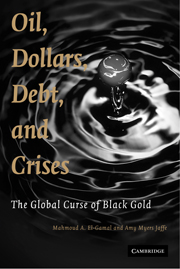Book contents
- Frontmatter
- Contents
- List of Illustrations
- List of Tables
- Foreword
- Preface
- 1 The Challenges of Resource Curses and Globalization
- 2 New Middle East: Childhood 1973–84 and Adolescence 1985–95
- 3 Road to the Status Quo: 1996–2008
- 4 Globalization of Middle-East Dynamics
- 5 Dollars and Debt: The End of the Dollar Era?
- 6 Motivations to Attack or Abandon the Dollar
- 7 Resource Curses, Global Volatility, and Crises
- 8 Ameliorating the Cycle
- Conclusion
- Notes
- Bibliography
- Index
7 - Resource Curses, Global Volatility, and Crises
Published online by Cambridge University Press: 05 June 2012
- Frontmatter
- Contents
- List of Illustrations
- List of Tables
- Foreword
- Preface
- 1 The Challenges of Resource Curses and Globalization
- 2 New Middle East: Childhood 1973–84 and Adolescence 1985–95
- 3 Road to the Status Quo: 1996–2008
- 4 Globalization of Middle-East Dynamics
- 5 Dollars and Debt: The End of the Dollar Era?
- 6 Motivations to Attack or Abandon the Dollar
- 7 Resource Curses, Global Volatility, and Crises
- 8 Ameliorating the Cycle
- Conclusion
- Notes
- Bibliography
- Index
Summary
Hyman Minsky wrote during the late twentieth century, explaining why political rhetoric has masked the financial forces that have caused significant amplification of economic cycles since the collapse of the Bretton-Woods system. The primary target of his attack was the (still) dominant neoclassical school of economic thought, which has continued to deny many of the economic dimensions of the financial crisis that started during 2008 as “myths.” In criticizing this neoclassical school's adoption of “real business cycle” models that abstract from cycles driven by financial markets, Minsky wrote:
A theory that denies what is happening can happen, sees unfavorable events as the work of evil outside forces (such as the oil crisis) rather than as the result of characteristics of the economic mechanism, may satisfy politicians' need for a villain or scapegoat, but such a theory offers no useful guide to a solution of the problem. …
The economic instability so evident since the late 1960s is the result of the fragile financial system that emerged from cumulative changes in financial relations and institutions of the years following World War II.
In writing this book, we have at times focused on Minsky's favorite link between economic activity and financial market structure and regulation. However, we have also suggested, perhaps in the same spirit, that understanding the overall cycle, and the potential for severe crises if the cycle was not regulated properly, would require understanding the links to resource economics, especially energy markets, and geopolitical developments in the part of the world where most of those resources are located.
- Type
- Chapter
- Information
- Oil, Dollars, Debt, and CrisesThe Global Curse of Black Gold, pp. 143 - 170Publisher: Cambridge University PressPrint publication year: 2009



